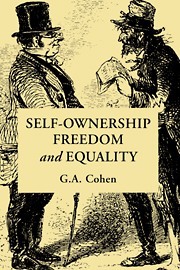Book contents
- Frontmatter
- Contents
- Preface
- Acknowledgements
- Introduction: history, ethics and Marxism
- 1 Robert Nozick and Wilt Chamberlain: how patterns preserve liberty
- 2 Justice, freedom, and market transactions
- 3 Self-ownership, world-ownership, and equality
- 4 Are freedom and equality compatible?
- 5 Self-ownership, communism, and equality: against the Marxist technological fix
- 6 Marxism and contemporary political philosophy, or: why Nozick exercises some Marxists more than he does any egalitarian liberals
- 7 Marx and Locke on land and labour
- 8 Exploitation in Marx: what makes it unjust?
- 9 Self-ownership: delineating the concept
- 10 Self-ownership: assessing the thesis
- 11 The future of a disillusion
- Bibliography
- Index of names
- Subject index
9 - Self-ownership: delineating the concept
Published online by Cambridge University Press: 29 August 2009
- Frontmatter
- Contents
- Preface
- Acknowledgements
- Introduction: history, ethics and Marxism
- 1 Robert Nozick and Wilt Chamberlain: how patterns preserve liberty
- 2 Justice, freedom, and market transactions
- 3 Self-ownership, world-ownership, and equality
- 4 Are freedom and equality compatible?
- 5 Self-ownership, communism, and equality: against the Marxist technological fix
- 6 Marxism and contemporary political philosophy, or: why Nozick exercises some Marxists more than he does any egalitarian liberals
- 7 Marx and Locke on land and labour
- 8 Exploitation in Marx: what makes it unjust?
- 9 Self-ownership: delineating the concept
- 10 Self-ownership: assessing the thesis
- 11 The future of a disillusion
- Bibliography
- Index of names
- Subject index
Summary
To every Individuall in nature is given an individual property by nature, not to be invaded or usurped by any: for everyone as he is himselfe, so he has a self propriety, else could he not be himselfe … Every man by nature being a King, Priest and Prophet in his owne naturall circuit and compasse.
(Richard Overton, An Arrow Against all Tyrants)… every man has a property in his own person; this nobody has any right to but himself. The labour of his body and the work of his hands we may say are properly his.
(John Locke, Second Treatise of Government)Man can neither be inherited, sold, nor be made the object of a gift; he can be no one else's property because he is his own property.
(Johann Gottlieb Fichte, A Discourse on the Reclamation of the Freedom of Thought from the Princes of Europe, who have hitherto Suppressed it)1. In Chapters 3–7 I studied the implications of the thesis of self-ownership for the question of the justice of the distribution of goods of all kinds. With respect to that general question of distributive justice, principles about the ownership of the physical world have a bearing no smaller than that of principles about who owns whose powers.
- Type
- Chapter
- Information
- Self-Ownership, Freedom, and Equality , pp. 209 - 228Publisher: Cambridge University PressPrint publication year: 1995

